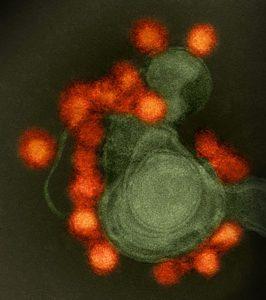
Transmission electron microscope image of negative-stained, Fortaleza-strain Zika virus (red), isolated from a microcephaly case in Brazil. (NAID, Wikimedia Commons)
Antibodies play an integral role in immunity against flavivirus infection and disease, making them ideal targets for serological diagnosis of flavivirus infections. Cross reactive antibody responses to flaviviruses, such as Dengue (DENV) and Zika (ZIKV), have been observed and is attributed to the similar structure of flaviviruses. This results in false positive serological diagnosis of flavivirus infections. The increase in the co-circulation of flaviviruses ,DENV, ZIKV and yellow fever in the Americas, has highlighted the need for improved serological diagnostics. Diagnostics that are capable of distinguishing infection caused by the different flaviviruses with a high specificity and sensitivity.
Cross-reactive of flavivirus antibodies predominantly bind to the fusion loop domain of the flavivirus envelope (E) protein. Introduction of mutations in the protein has reduced cross-reactivity of antibodies and resulted in differential diagnosis of west nile virus and dengue fever. Rockstroh et al. utilised this technology to develop a potential serological diagnostic that is capable of distinguishing antibody responses to Zika and Dengue virus.
Rockstroh et al. compared IgM and IgG antibody responses -from individuals who were either residents or travelled to ZIKV and DENV endemic regions- to mutated fusion loop domains of the ZIKV and DENV E protein. Rockstroh et al. observed no cross-reactive DENV-specific IgM responses to ZIKV with a 90.7% sensitivity and 100% specificity. A similar cross-reactive profile of ZIKV-specific IgM responses to DENV were observed with sensitivity of 87.5% and lower specificity of 90.7%.
Rockstroh et al. utilised a competition ELISA to detect IgG responses, where sample sera were pre-incubated with competing antigen ,mutated DENV E protein, before addition of the antigen of interest ,mutated ZIKV E protein, and vice versa. This competition ELISA allowed the detection of IgG responses to ZIKV and DENV mutated E-protien with a specificity of 100% and 94.4%, respectively. Additionally, the competition ELISA allowed the detection of co-infected individuals as well as reduced the detection of false positive cross-reactive antibody responses detected using direct ELISA.
In Summary, Rockstroh et al. developed a potential DENV and ZIKV diagnostic that reduces the detection of false positive ZIKV and DENV infection as well as enable the detection of DENV and ZIKV co-infection using the same assay.
Journal Article: Rockstroh et al. 2017. Specific detection of dengue and Zika virus antibodies using envelope proteins with mutations in the conserved fusion loop. Emerging Microbes & Infections
Article by Cheleka AM Mpande











